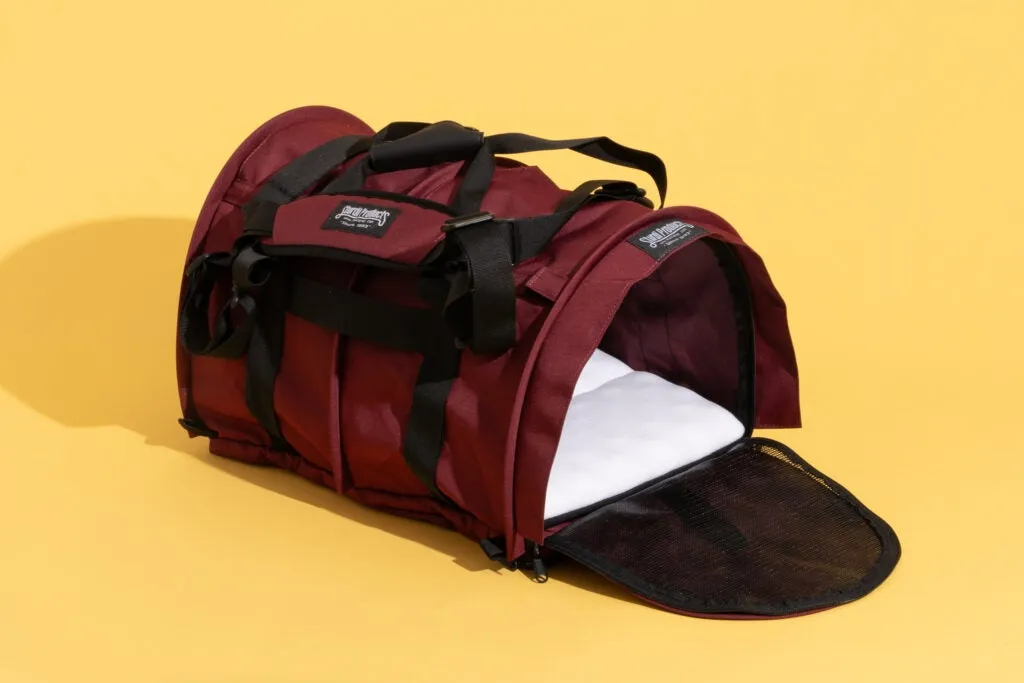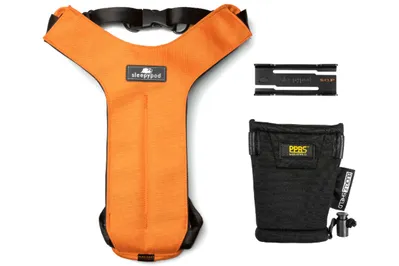Bringing a new dog home is an exciting time, but it’s also important to be prepared. Before you welcome your furry friend, make sure you have all the essential supplies to ensure their comfort, safety, and well-being. This checklist covers everything you’ll need to get started.
1. Travel Carrier or Restraint Harness:
The first thing you’ll need is a safe way to bring your new dog home. For smaller dogs and puppies, a travel carrier is the best option. It provides a secure and comfortable space during the journey.
 Our pick for best travel carrier for cats and small dogs, the SturdiBag Pro 2.0, on a yellow background.
Our pick for best travel carrier for cats and small dogs, the SturdiBag Pro 2.0, on a yellow background.
The SturdiBag Pro 3.0 is a great option because it’s well-ventilated and has a flexible rod frame, making it suitable for car trips and airplane travel. Always place the carrier on the floor behind the front seat for maximum safety during car rides. The machine-washable design is a bonus for easy cleaning.
For larger dogs that don’t fit comfortably in a carrier, a restraint harness is necessary to keep them secure in the car.
 Sleepypod Clickit Sport Plus dog car harness
Sleepypod Clickit Sport Plus dog car harness
The Sleepypod Clickit Sport Plus is a crash-tested harness certified by the Center for Pet Safety, offering excellent protection in case of an accident. It also features reflective stripes and metal D-rings, making it suitable for short walks during travel breaks.
2. Food and Water Bowls:
Your new dog will need dedicated bowls for food and water. Choose bowls that are appropriately sized for your dog’s breed and age. Stainless steel bowls are a durable and hygienic option, as they are easy to clean and resistant to bacteria. Consider elevated bowls for larger breeds to promote better posture and digestion.
3. High-Quality Dog Food:
Proper nutrition is crucial for your dog’s health and well-being. Select a high-quality dog food that is formulated for their age, breed, and activity level. Consult with your veterinarian to determine the best food option for your dog’s specific needs. When transitioning to a new food, do so gradually to avoid digestive upset.
4. Collar, Leash, and ID Tag:
A collar, leash, and ID tag are essential for your dog’s safety. The collar should fit comfortably but securely, with enough room to insert two fingers underneath. The leash should be durable and appropriate length for walks and training. The ID tag should include your dog’s name, your contact information, and any necessary medical information. Consider microchipping your dog as an added layer of protection in case they get lost.
5. Bedding:
Provide your new dog with a comfortable and cozy bed where they can rest and relax. Choose a bed that is appropriately sized for your dog and made from durable, washable materials. Consider your dog’s sleeping preferences – some dogs prefer soft, plush beds, while others prefer firmer, more supportive beds. Place the bed in a quiet and comfortable area of your home where your dog can feel safe and secure.
6. Toys:
Toys are essential for providing mental and physical stimulation for your dog. Choose a variety of toys that are appropriate for their age, size, and play style. Durable chew toys can help satisfy your dog’s natural chewing instincts and prevent destructive behavior. Puzzle toys can provide mental stimulation and challenge your dog’s problem-solving skills. Soft plush toys can provide comfort and companionship.
7. Grooming Supplies:
Regular grooming is important for maintaining your dog’s health and hygiene. Essential grooming supplies include a brush, nail clippers, dog shampoo, and toothbrush and toothpaste. Choose a brush that is appropriate for your dog’s coat type. Regular brushing helps remove loose hair and prevent mats and tangles. Trim your dog’s nails regularly to prevent overgrowth and discomfort. Bathe your dog as needed, using a dog-specific shampoo. Brush your dog’s teeth regularly to maintain good oral hygiene.
8. Training Treats:
Training treats are a valuable tool for rewarding good behavior and reinforcing training commands. Choose small, soft treats that are easy for your dog to chew and swallow. Use treats sparingly and as part of a balanced training program.
9. Poop Bags:
Always be prepared to clean up after your dog when you’re out for a walk. Poop bags are an essential item for responsible dog ownership.
10. First-Aid Kit:
A well-stocked first-aid kit is essential for addressing minor injuries and emergencies. Include items such as bandages, antiseptic wipes, gauze pads, and a pet-safe thermometer. Consult with your veterinarian for a complete list of recommended items.
Having these essential supplies on hand before you bring your new dog home will help ensure a smooth and successful transition. Remember to be patient, loving, and consistent, and enjoy the wonderful journey of dog ownership!
